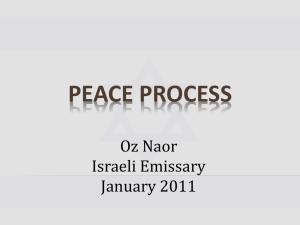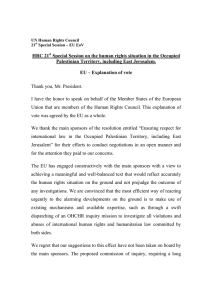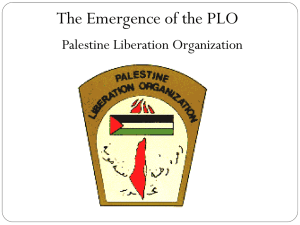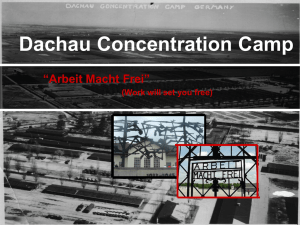Aug 2012
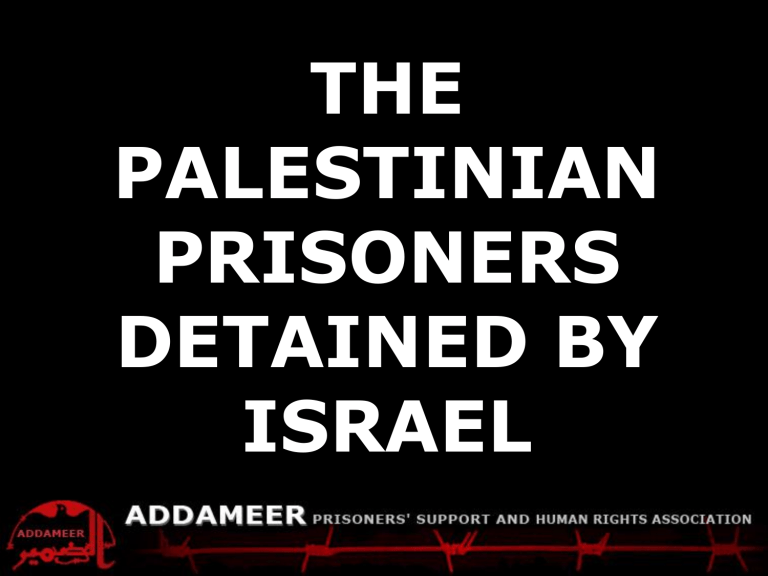
ADDAMEER Fact Sheet
THE
PALESTINIAN
PRISONERS
DETAINED BY
ISRAEL
Sin ce the beginning of the Israeli occupation of
Palestinian territories in 1967, over 800,000
Palestinians have been detained by Israel
.
This forms approximately
20% of the total
Palestinian population in the Occupied
Palestinian
Territories
(OPT)
40%
The number of
Palestinians detained forms approximately
40%
of the total male
Palestinian population in the OPT.
As of August 2012
4,660
Palestinian political prisoners are being held in Israeli prisons.
On 18 October 2011, 477 prisoners were released as part of an exchange which also saw the release that same day of
Israeli soldier Gilad Shalit, who was held by captured in Gaza in 2006. Out of this number, 205 were transferred to the Gaza
Strip or abroad. Another 550 Palestinian prisoners were released as part of the deal in December 2011.
210
of the political prisoners are aged 18 and under
6
of the political prisoners are
Palestinian female political prisoners
250
of the political prisoners are administrative detainees
The arrest and detention of Palestinians living within the OPT is governed by a wide-ranging set of military regulations that govern every aspect of Palestinian civilian life.
There are approximately 1,650 military regulations governing the West Bank. Up until Israel’s withdrawal from Gaza, there were over 1,500 governing the Strip.
The Israeli military commander of the region issues military orders, and the issuance of new orders often remains unknown and become apparent when they are implemented.
The Process of Arrest
Arrest can happen anywhere and everywhere
• At home
• On streets or roads
• At Israeli checkpoints
• At border crossings
During house searches it is common for Israeli soldiers to :
1.Destroy personal property
2.Break down doors
3. Subject family members to stripsearches
4. Use other family members as a means to exert pressure
• Upon Arrest , detainees are not informed of the reason for their arrest, nor are they told where they will be taken.
• Physical abuse and humiliation of the detainee by Israeli forces is common.
•During their arrest, detainees have often been forced to strip in public before being taken into custody.
Legal System Governing Detention
Under Israeli military regulations:
1. The army is not obliged to inform the detainee's family of their arrest or the location of their detention.
2. Up until August 2012, a Palestinian could be detained for up to 8 days without the Israeli military informing the detainee of the reason for his/her arrest and without being brought before a judge. A new amendment changed this period to 4 days, but it remains to be seen whether or not this will improve the treatment of prisoners in the initial period following arrest.
After or within the initial 4-day period
The Palestinian detainee is:
• sent to an interrogation center
• placed in administrative detention
• held in custody awaiting a charge sheet and trial,
• or released
.
Prisons And Detention Camps
There are a total of:
Israeli prisons and military detention camps are primarily located within the
1948
borders of
Israel.
4
3
17
• 4 i nterrogation centers.
• 3 detention centers.
• About
17
prisons held.
Interrogation and Torture
Prior to the new amendment in August 2012, a Palestinian detainee could be interrogated for a total period of
188 days
, during which he/she can also be denied lawyer visits for a period of
90 days
. The current law states that a Palestinian detainee can now be interrogated for
90 days , and denied lawyer visits for
60 days .
During the interrogation period, a detainee is often subjected to some form of cruel, inhuman or degrading treatment ranging in extremity, whether physical or psychological. Indeed, the isolation and solitary confinement of prisoners is regularly used as a form of psychological torture. The use of practices that constitute torture during interrogation has been outlawed within the Israeli judicial system; however, it is permitted in individual cases in which the Israeli
Security Agency (ISA) deems a detainee a threat to state security or a
‘ticking bomb’. In some instance detainees have died while in custody as a result of torture.
Israeli Military courts
• Palestinians are tried within Israeli
military courts located within
Israeli military bases in the OPT.
• These military tribunals are presided over by judges appointed by the military. Most of the judges do not have long term judicial training.
• These tribunals rarely fall within the required international standards of fair trial.
Description of offenses
Military courts serve indictments based on a broad range of offenses divided into five separate categories:
• “Hostile Terrorist Activity”
• Disturbance of public order
• “Classic” criminal offenses
• Illegal presence in Israel; and,
• Traffic offenses committed in the OPT
Examples
Examples of Charges Under
Military Law
• Participation in a demonstration is deemed a disruption of public order.
• Carrying or placing a Palestinian flag is a crime in itself under Israeli military regulations
• Belonging to any political party or certain organizations listed in military order
• Writing political slogans on the Wall
• Participating in an exhibition to benefit a charity organization linked to Hamas is a crime of "terrorist association”
Discriminatory Laws
There are several stark discrepancies between Israeli law pertaining to Palestinian and Israeli “security” detention respectively .
Palestinian
Israeli
• held without charge, by order of a military judge, for an initial period of up to 60 , which can be extended to an additional 30 days by a judge of the Military Appeal Court.
• lawyer visits can be prohibited for up to 60 days.
•held without charge for an initial period of 35 days by judicial order, which can be extended for another 15 days and an additional 15 days by the Attorney General.
•an Israeli ‘security’ detainee and his attorney can only be prevented from meeting for a total of 21 days .
Administrative Detention
Administrative detention, arrest without charge or trial
Administrative detention is based on secret information brought forward during military tribunals, to which neither the detainee nor his/her lawyer have access to.
Administrative detention is indefinitely renewable under military regulations. A detainee may be given an administrative detention order for a period of between
1 – 6 months, after which the order may be renewed again.
Detention conditions
Prison conditions in Israeli prisons are harsh.
• In most Israeli prisons, there is overcrowding , a lack of very basic amenities, poor hygiene, humidity and a significant lack of fresh air.
• The Israeli Prison Service (IPS) rarely provides essential hygiene products, cleaning supplies and soap, forcing prisoners to purchase these items in the prison canteen at very high prices.
• Most prisoners complain about the poor quality and insufficient quantities of food prepared by the IPS and must purchase food to supplement their diet from the prison canteen.
Family Visits
• Most prisons are located in
Israel so Palestinian families from the occupied territory who wish to visit a family member detained in Israel must receive an entry permit into Israel.
• Only first degree relatives may visit prisoners.
• Men between the ages of 16 and 45 are typically prevented from visiting prison. They receive special permits only once or twice a year.
• When allowed, visits only last
45 min and take place through a glass divider.
,
Family Visits
• In 2007, Israeli authorities suspended all family visits to prisoners from Gaza .
• In 2009, the Israeli High
Court of Justice rejected an appeal against this policy.
• Following the hunger strike agreement of May 2012,
Israel agreed to resume family visits from Gaza.
However, as of the end of
August, only 221 of the 449 prisoners from the Gaza Strip had received family visits.
,
Women in Detention
• Beatings, insults, threats, sexual harassment and humiliation are techniques used by Israeli interrogators to intimidate Palestinian women and coerce them into giving confessions.
• In prison, degrading and intrusive body searches often occur during transfers to court hearings and can sometimes take place in the middle of the night as a punitive measure.
There are currently
6 female
Palestinian political prisoners
• Between 2003–2008, there were four cases of women giving birth in Israeli detention.
Pregnant prisoners transferred to the hospital to give birth are typically chained to their beds until they enter delivery rooms and shackled once again minutes after delivery.
Child Detainees
Approximately 700 Palestinian children (under 18) from the West
Bank are prosecuted every year through Israeli military courts.
Since 2000, more than 8,000 Palestinian children have been detained.
There are currently 210 child prisoners, including 34 under the age of 16
• Israeli military order 132 established that Palestinian children age 16 and older are tried and sentenced by Israeli military courts as adults.
• On 27 September 2011, Israel announced Amendment 10 to
Military Order 1651, which newly classified Palestinian adulthood as 18.
• Palestinian children may be charged and sentenced in military courts from the age of 12 and are sentenced according to their age at the time of sentencing.
Hunger Strikes of 2011 and 2012
On 27 September 2011, parts of the prisoner population announced a hunger strike, in protest at the worsening conditions inside the prisons, and demanding an end to the use of isolation, the full reinstatement of education and access to books, an end to the practice of shackling to and from family and lawyer visits, and the removal of short time limits placed on family visits. By mid-October, at least 2,000 prisoners had joined the campaign.
Israeli prison authorities responded with a number of punitive measures, which included putting hunger strikers into isolation, denial of salt – a vital nutrient for the hunger strikers – and denial of lawyer visits .
On 18 October the hunger strike was suspended after Israel announced it would meet the prisoners’ demands and stop the use of isolation. At the beginning of November, 20 prisoners reportedly still remained in isolation , and other restrictions continued to be imposed on the prisoners.
Following the historic individual hunger strikes of administrative detainees such as Khader Adnan and Hana Shalabi beginning in
December 2011, Palestinian prisoners launched another mass hunger strike on 17 April 2012, Palestinian Prisoners’ Day. At the height of the hunger strike, over 2,000 prisoners were estimated to be on hunger strike. The IPS imposed harsh punishments on hunger strikers.
Hunger Strikes
Prisoners’ demands included: an end to the IPS’ abusive use of isolation for “security” reasons; an end to Israel’s use of administrative detention ; and a repeal of punitive measures taken against them following the capture of Israeli soldier Gilad Shalit, including the denial of family visits for all Gaza prisoners since 2007.
On 14 May, the committee of prisoners representing the hunger strikers reached an agreement with Israeli authorities to end the 28day hunger strike . In the agreement, Israel agreed to remove from isolation the 19 prisoners in long-term isolation, to resume family visits to prisoners from Gaza and West Bank families who were previously denied, to form a committee to improve basic conditions for the prisoners, and to limit the use of administrative detention .
As of 30 August, there remain 2 prisoners in long-term isolation .
Furthermore, only 221 of the 449 Gaza prisoners have received family visits . The administrative detention policy remains unchanged, and former hunger strikers received renewals on their orders, causing two,
Samer Al-Barq and Hassan Safadi, to re-launch their hunger strikes .
An additional prisoner, Ayman Sharawna, who was released in the exchange deal and later re-arrested, also remains on hunger strike.
